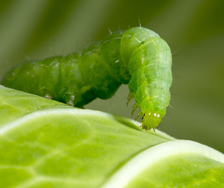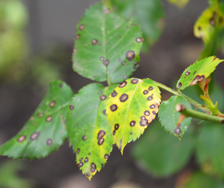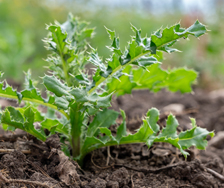Yates Account
Join now
Create a Yates account today!
Sign up to join the Yates Garden Club for monthly e-mails packed with seasonal inspiration, tips for success & exclusive promotions.
Plus if you’re a Garden Club member you can take part in the Yates Growing Community - a blog to share successes, get advice & win prizes in fun challenges along the way!

Forgot password
Enter the email address associated with your account, and we'll email you a new password.

Every year, the spring frenzy of fresh new leaf growth and flowers encourages a population explosion of sucking and chewing insect pests.
Here's how to stop the little blighters from feasting on your garden.
During spring, vegetables are vulnerable to a range of insect pests, all desperate to harvest your vegies before you can! Ornamental shrubs and trees like roses, hibiscus, camellias and azaleas are susceptible to the annual onslaught of hungry insects. The same goes for citrus and fruit trees.
Sucking insect pests like passionvine hoppers, aphids, scale, thrips, mealybugs, psyllids, whitefly and feed on sweet and sugary plant sap. This depletes important nutrients from your plants. These nasty little suckers can cause leaves to permanently discolour and distort, or even transmit plant viruses.
To add insult to injury, sucking insects excrete a substance called honeydew, which invariably gets covered in unsightly sooty mould. Sooty mould appears as an ashy black layer, that covers leaves and stems. Honeydew will also attract ants, which you can often see travelling up and down plant stems to collect the sweet booty.
Chewing insects like caterpillars are a major pain in spring; they can voraciously eat through foliage, stems, buds and flowers and do a lot of damage in a short time. In late spring, bronze beetles begin to fly in swarms; they can also cause a lot of damage to trees and vegie gardens along their flight paths.
Slugs and snails are out in force during spring: they're a menace to your seedlings. They can devour young seedlings overnight, plus, slugs will wait for their chance to slime their way in amongst the leaves of developing cabbage and lettuces and hide there, so you can have a nice 'surprise' during meal preparation.
Read on for tips to diagnose and tackle pests early, for a more successful spring and summer season.
Identifying Aphids

Aphids are small pear-shaped insects, about 2–4mm long. You'll often see them swarming a plant in huge numbers. You may see miniature aphids in amongst them; these are immature nymphs (aphids can give birth to live young, which allows them to multiply really quickly). Small colonies increase rapidly in warm conditions, and large infestations can develop in a matter of days. Inspect your plants a couple of times a week as soon as the weather warms up, so you can keep aphids in check while populations are relatively small.
Aphids cause damage to plants directly through feeding, or indirectly as vectors of harmful viruses (which they inject into your plants in their saliva). They prefer to cluster on fresh young shoots and flower buds, or underneath older leaves.
There are 80+ different species of aphids in NZ; they all have different plant preferences, but between them they manage to attack fruit trees, citrus, roses, camellias and a wide range of vegetables. Here are some of the most commonly encountered pest aphids during spring:
- Black Citrus Aphids (Aphis citricidus) are glossy black or dark brown. You'll see them clustered in huge numbers on the growing tips of citrus trees in spring. These aphids are usually the culprits when leaf curl appears in citrus trees.
- Onion Aphids, AKA Black Aphids (Neotoxoptera formosana) are a serious pest of garlic, onions, chives, leeks and other alliums.
- The Cabbage Grey Aphid (Brevicoryne brassicae) is greyish-green, with a powdery-looking waxy coating. It feeds on all types of brassica crops, usually hiding on the underside of leaves.
- The Rose Aphid (Macrosiphum rosae) is common pest of roses. Green or pinkish coloured aphids can be seen swarming on flower buds and tender growing tips.
- Strawberry Aphids (Chaetosiphon fragaefolii) are pale yellow in colour. These aphids spread strawberry mottle virus: a very damaging disease that stunts growth, yellows leaves and impedes fruiting. During spring they're often found on the underside of strawberry leaves, so good spray coverage is important to control them effectively.
Yates Mavrik Insect & Mite Spray - Concentrate
Yates Mavrik Insect & Mite Spray - Ready to Use
Yates Nature's Way Organic Citrus, Vegie & Ornamental Spray
Yates Conqueror Spraying Oil
Yates Nature's Way Pyrethrum Natural Insect Spray - Concentrate
Yates Nature's Way Vegie Insect Spray Natrasoap - Concentrate

Worsening Whitefly
Fortunately, Whiteflies usually don't get started until November, becoming a bigger challenge over summer. They resemble tiny white moths with a wingspan of 3mm. They've become very prevalent in recent years and tare major pests for home gardeners. Both the adult and juvenile (nymph) whiteflies feed by sucking the phloem sap from plants, causing a lot of damage in the process. Infestations of whitefly can drastically impede plant growth and reduce crop yields. They can cause wilting and stunting of new shoots, yellowing of leaves, uneven ripening of tomatoes and sometimes plant death.
Whitefly are easy to identify: if the plant host is disturbed, a distinctive 'flittering cloud' of tiny insects fly out, but they soon settle back onto the same plant.
Whitefly is challenging to control, as it goes through two life stages that are resistant to pesticides. This explains why a single spray won't always control it completely. A quick explanation of the whitefly life cycle will be helpful to understand why: adults lay eggs on young leaves, close to where they are feeding. When the eggs hatch out, they go through four different larval stages, that look like tiny scale insects, before forming a pupa, then emerging as an adult.
The big challenge is that the egg and pupal stages are very resistant to pesticides (although the adults and youngest nymphs are easily controlled). Because you can usually find all the different whitefly life stages on the same leaf at the same time, a single spray often won't kill them all, so the survivors can quickly mature and carry on feeding. When whitefly pest pressure is high, this can allow their population to recover before the next scheduled insecticide spray is due.
How to Stay Ahead of Whitefly
Whitefly is best controlled using two different insecticides and alternating them, in overlapping applications. Don't be tempted to shorten the spray intervals of any of our whitefly control products (always stick to the instructions) because whitefly can build up chemical resistance very quickly. Instead, if you alternate between different insecticides with different modes of action, this delivers the effect you're looking for.
For example, if you apply Yates Mavrik at the weekend, sticking to 1-week spray intervals, and then alternate with a mid-week dose of Yates Nature's Way Natrasoap Vegie Insect Spray at 1-week intervals, you'll be able to interrupt the whitefly life cycle and get complete control. Ensure you get complete spray coverage, including on the underside of leaves.
Yates Mavrik Insect & Mite Spray - Concentrate
Yates Nature's Way Organic Citrus, Vegie & Ornamental Spray
Yates Mavrik Insect & Mite Spray - Ready to Use
Yates Nature's Way Vegie Insect Spray Natrasoap - Concentrate
Yates Nature's Way Pyrethrum Natural Insect Spray - Concentrate

Maddening Mealybugs
Mealybugs are small flat-bodied insects, covered with a powdery-looking white coating; some have a fringe of white cottony threads attached to their bodies. They feed by sucking on plant sap, then excrete a sweet, sticky substance called honeydew which attracts ants. Honeydew also provides a perfect medium for sooty mould growth.
A persistent offender is the Longtailed Mealybug (Pseudococcus longispinus)
Mild temperatures and high humidity are perfect conditions for mealybugs to breed, as a new generation of eggs hatches every 2-3 weeks, from spring right through to autumn. Immature mealybugs prefer to hide in plant crevices or in the elbows between leaves and stems, so by the time you spot an adult the population can be bigger than you expect. Fortunately, prolonged hot weather helps to reduce numbers, so mealybug numbers peak in November and then decline over summer.
Yates Nature's Way Organic Citrus, Vegie & Ornamental Spray
Yates Conqueror Spraying Oil
Hungry Hungry Caterpillars

Adult moths and butterflies are harmless to your plants and even do good service as pollinators. Unfortunately, their caterpillar larvae have chewing mouthparts and a voracious appetite, so even the smallest of caterpillars can eat through mountains of foliage; left unchecked they can skeletonise leaves and completely ruin flowers.
Regular monitoring of your garden means a major incursion won’t catch you unawares: caterpillar control methods are much more effective if you can tackle an infestation early.
The main vegetable pest caterpillars you’ll run into in spring are the Diamondback Moth, Cabbage White Butterfly and Tomato Fruitworm.
If you prefer a natural control option, try Yates Nature’s Way Citrus, Vegie & Ornamental Insect Spray. It’s an organically certified pyrethrum and oil combination insecticide, with twin modes of action against garden pests. Made from natural pyrethrum (from the pyrethrum daisy) and canola oil, this formula effectively controls a wide range of insect pests, including caterpillars. It’s BioGro approved for organic gardening. Spray leaves thoroughly, including the undersides, as caterpillars often hide there.
Manual control methods can be quite effective: placing fine insect netting over plants can prevent adult moths or butterflies laying eggs on your plants. You can also disrupt the caterpillar life cycle by pinching off leaves with eggs or small caterpillars on them, along with picking off and squishing large caterpillars.

Caterpillars are also a classic challenge for fruit tree growers. Spring is a critical time to prevent Codling Moth or Oriental Fruit Moth boring into your pipfruit and spoiling it, because you'll need to be ready to apply Yates Success Ultra as soon as petals have fallen. This clever product is derived from fermented soil bacteria (Saccharopolyspora spinosa). The active ingredient (Spinetoram) has a translaminar action that enables it to move through the leaf from the upper to lower leaf surfaces, providing effective control of pests that hide on the underside of leaves.
Yates Success Ultra Insect Control - Concentrate
Yates Mavrik Insect & Mite Spray - Concentrate
Yates Mavrik Insect & Mite Spray - Ready to Use
Yates Nature's Way Organic Citrus, Vegie & Ornamental Spray
Yates Nature's Way Derris Dust
Yates Nature's Way Pyrethrum Natural Insect Spray - Concentrate
Identifying Scale Insects

The spring growth flush is irresistible to scale insects, so they're a major pest at this time of year. Scales drive their mouthparts into plant cells and suck out the contents, which eventually causes severe damage to the plant (which becomes much worse when the scale population gets high).
Adult scales form a protective shell and become immobile, locking themselves in place like limpets. Scale species can look quite different to one another: some species (known as soft scales or wax scales) exude waxy or fluffy-looking coatings, which can be white or pink in colour. Some species don't form any coating (these are known as hard scales) and are disguised better, as they look like raised brown or black bumps on leaves and stems.
Telltale symptoms of a scale infestation are ants speeding up and down plant stems (they're attracted to the sticky honeydew that scale excrete) and sooty mould, which grows on the honeydew residues.
Although most contact insecticides don't have any effect on scale because it's protected under a shell, it's easily controlled with regular sprays of Yates Conqueror Spraying Oil. Once the scale insects are gone and the source of the honeydew disappears, the ants and sooty mould will also depart. Dead scale can remain on the plant for a few weeks after spraying; if it's easy to brush off with a fingernail it indicates it's dead.
Yates Conqueror Spraying Oil is certified for use in organic gardening by BioGro NZ.
Yates Conqueror Spraying Oil
Yates Nature's Way Organic Citrus, Vegie & Ornamental Spray
Destructive Snails and Slugs

Snails and slugs can devour young seedlings overnight, or slime their way in amongst the leaves of the developing cabbage or lettuce heads. These pests are most active on cool, wet and humid nights. They prefer moist environments and live off decaying animal matter and algae, but they're also delighted if they can find appetising plant material like your vegie leaves and stems.
To prevent damage to your vegies, lightly scatter some Yates Blitzem Snail Slug Pellets around the plants.

Yates Blitzem
Watch Out For Passionvine Hoppers

Passionvine hoppers (Scolypopa australis) can cause damage to a very wide variety of edible and ornamental plants. You'll begin to see their juvenile nymphs in spring, as eggs hatch. Nymphs are sometimes called “fluffy bums”, due to the tuft of white fluff (filaments) attached to the tip of their abdomen. These long filaments can be fan-shaped and look a bit like a peacock’s tail.
Populations can skyrocket quickly in summer, when heavy infestations combined with water stress can potentially kill host plants. It makes sense to tackle passionvine hoppers early, to prevent their negative effect on plant health, vigour and fruiting.
Both adults and juveniles (nymphs) pierce the plants vascular system (phloem) and suck out plant fluids to extract sugars. Excess water and sugars are excreted as honeydew, so ants may also be present. Adults and nymphs can be found at the tips of stems, often in large groups. When disturbed, they can jump away, which sometimes produces a loud snapping or clicking noise. Adults characteristically jump, then fly away when disturbed.
Adults are most active from mid-summer to early autumn.

Yates Nature's Way Organic Citrus, Vegie & Ornamental Spray
Yates Nature's Way Pyrethrum Natural Insect Spray - Concentrate
Tomato-Potato Psyllid Damage

Psyllids are tiny sap-sucking insects that resemble miniature cicadas; you'll need a magnifying glass to see them properly. The main species of concern in spring is the tomato-potato psyllid (Bactericera cockerelli) also known as TPP, which has a special attraction to plants in the Solanaceae family, so tomatoes, potatoes, capsicum, eggplants, chillies, tamarillo and kumara are all affected.
Both juvenile (nymph) and adult stages damage plants by piercing and sucking sap from the leaves. They're especially attracted to weakened or unhealthy plants, so psyllid infestations can have devastating effects on stressed plant hosts. Unfortunately, tomato/potato psyllids also carry bacterial disease in their saliva, that can be injected into the plant while they feed (this is the primary cause of unsightly 'zebra chip' disease in potatoes).
A psyllid infestation can be hard to diagnose, because most of the symptoms are easy to mistake for other problems. Plants may become stunted, wilted, or develop yellow or purple upwards-curling leaves, often with purple leaf veins (the purple veins are a symptom of bacterial infection, which indicates psyllids may be the underlying cause). A more obvious symptom is a white sugary crystalline substance appearing on leaves; this is actually honeydew excreted by the psyllids (also known as 'psyllid sugar', it might be accompanied by sooty mould). If you disturb the plant foliage and see tiny insects springing out, they will probably be tomato-potato psyllids.
The most disappointing symptom of tomato-potato psyllid is getting tiny, inedible fruit at harvest time, for both tomatoes and potatoes.

Yates Mavrik Insect & Mite Spray - Concentrate
Yates Success Ultra Insect Control - Concentrate
Yates Mavrik Insect & Mite Spray - Ready to Use
Want a Short Cut?
Sometimes it’s hard to know exactly which insect is responsible for the damage – so it’s handy to have a do-it-all spray, that controls a really broad range of chewing and sucking insect pests.
Yates Nature’s Way Organic Citrus, Vegie & Ornamental Spray is our go-to organic control for aphids, mealybug, caterpillars, thrips, mites and whitefly. Keep it handy, so it's always ready to go as soon as you see pests! It contains a unique combination of pyrethrin (an extract from the pyrethrum daisy) and canola oil, to deliver two potent modes of action in a single spray. It's certified for use in organic gardening by BioGro NZ and registered for use on edible plants.























Share
Share this article on social media